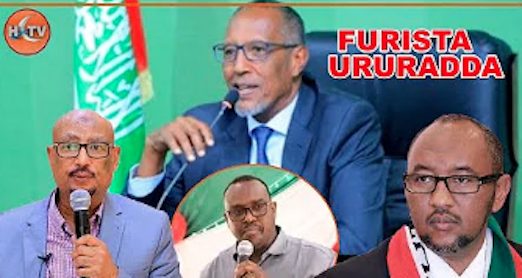Amid a protracted tug-of-war between the government and opposition elements revolving around Act 14/2021 on Political Parties and Associations, the government made an unexpected turnabout Sunday declaring political associations can be registered for upcoming presidential election next year.
“Political associations are open for anyone, any group taking a shot at expected elections in 2022,” Minister Suleiman Yussuf Ali koore of Information, speaking on behalf of the government, announced yesterday.
That caught the opposition with breaches down.
The debate during these past few days centred on how the parliament would handle amendments to Law No. 14 that the president made.
Would these be accepted and submitted to the floor for deliberation? Should they be rejected since the President did not return the changes to the parliament within the 21 days allotted time? How long will the Constitutional Court take to decide the issue if and when a disagreement on the issue surfaced?
Those were the core issues discussed within parties’ ranks and by the public. But never did the opposition expect that – with al the questions the current draft did not answer – the government will throw down the towel and invoke article 8 of the bill.
The Act on which the new version was based which still prevailed and most of whose contents got transferred to the new one dictated, in effect, that existing political parties approaching the end of their 10-year term cannot go into an election unless they adhered to article 8.
This article stipulates that political associations will register for transformation to national political parties six months before the end of the term of existing national parties.
“New political associations and political parties participating in direct elections must be registered six months before term of existing party certifications expire,” Article 8(4) of the political associations and parties act stated.
The certificates of Kulmiye, UCID and Waddani partied are due to expire in December 2022. Six months before that period will fall into June 2022. The presidential election was slated for 13 November 2022 – a month before the president’s current term came to an end.
Moreover, election of new MPs for the upper house of the Somaliland bicameral parliament was due on May 2022 – exactly a year after the lower house were elected on May 2021.
But opposition political parties for reasons that had nothing or little to do with existing laws and the constitution expected to run for the presidency as they were with only a month to go to the expiry of their certificates and without the registration and contest of more political associations/parties for the privilege as mandated by the law.
The transfer of the chairmanship of Waddani party from Abdirahman Mohamed Abdullahi ‘Irro’ – for one – to Hirsi Ali Haji Hassan completely rested on this surmise.
Neither was an adherence to the law favourable to UCID which did not expect to survive the stampede of a stiff competition with new, more motivated blood.
The reaction of the UCID and Waddani chairpersons, Faisal Ali Waraabe and Hirsi Ali Haji Hassan, respectively, showed how jolting the government announcement was.
Both chairmen criticised the President for springing surprises on the nation based on personal whims and calculations.
Both made it clear that never would they accept the opening of political associations before the nation voted its next president to office.
Neither, however, explained how one could circumnavigate wound existing laws to do so.
Faisal, particularly, got so worked to a stage he put a question mark on the 1991 and 1993 resolutions on whose tenets the Republic of Somaliland was founded.
“We will call for a national salvation conference. We will re-open the Borama decision and that of 1991 for discussion,” he said flagging those decisions red – an area that laid the whose of Somaliland bare to a 31-year-old ridicule.
The heat of Sunday spilled over to Monday.
MPs representing the opposition and the ruling party exchanged blows at parliament Monday morning.
Responding to disturbance of peace calls, mounted police units entered the parliament compound and a new fracas ensued. Pushing and shoving started between the MPs and the police officers which ended in the police firing into the air to push back the MPs – creating a precedent that would certainly go into the notes of visiting delegations as it would in the annals recorded of these times.
Short of making of effecting a significant rehaul to existing laws and the national constitution, there is no discernible way out to go into the November elections without (a) electing/selecting new Guurti MPs; and (b) the registration and approval of new political associations to take part in a direct, nationwide election of the next president in the absence of a local councils elections.
Without that a term extension for the incumbent president would be inevitable.
And this is exactly what the opposition is afraid of based on other reasons.
UCID and Waddani believe that if new political associations come aboard the President will engineer a one to two-year extension for himself to give time to the amendments he proposed to the parliament.
Somaliland went into 8 1Person-1Vote elections many of whom came to pass only after heated, often very caustic situations preceding them.
To all, nonetheless, the current situation presents a more piqued Hobson’s choice; go to the November 2022 polls as is and break the law, open political associations and run the risk of creating an anarchic, untenable situation. The country, certainly, cannot survive three nationwide elections close on each other’s heels: the Guurti’s, that to decide which political parties pass to national parties, and the Presidential. It has neither the necessary resources nor the capacity to buck the combined fallout.
The public and most observers are, however, confident that a settlement of sorts will follow the prevailing impasse.![]()




























